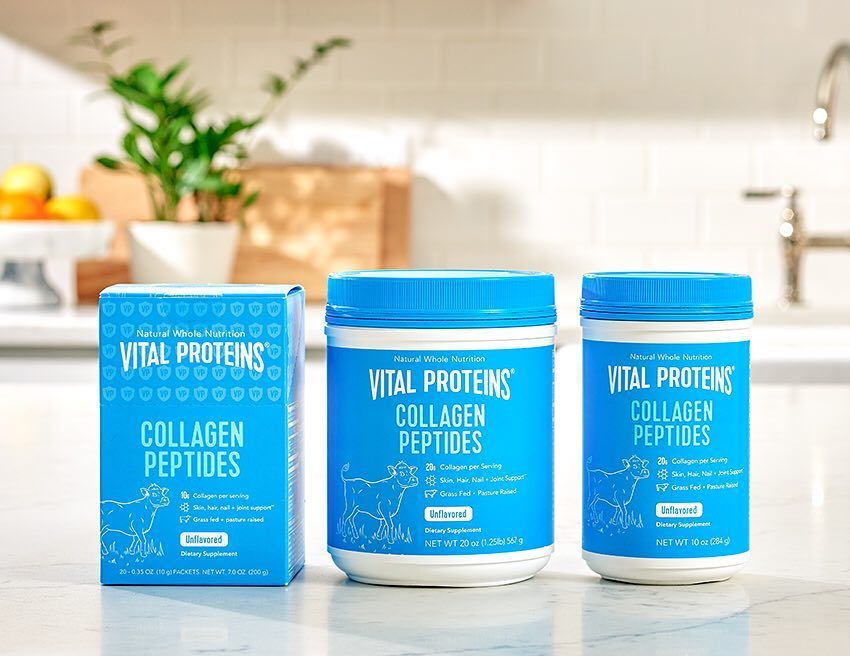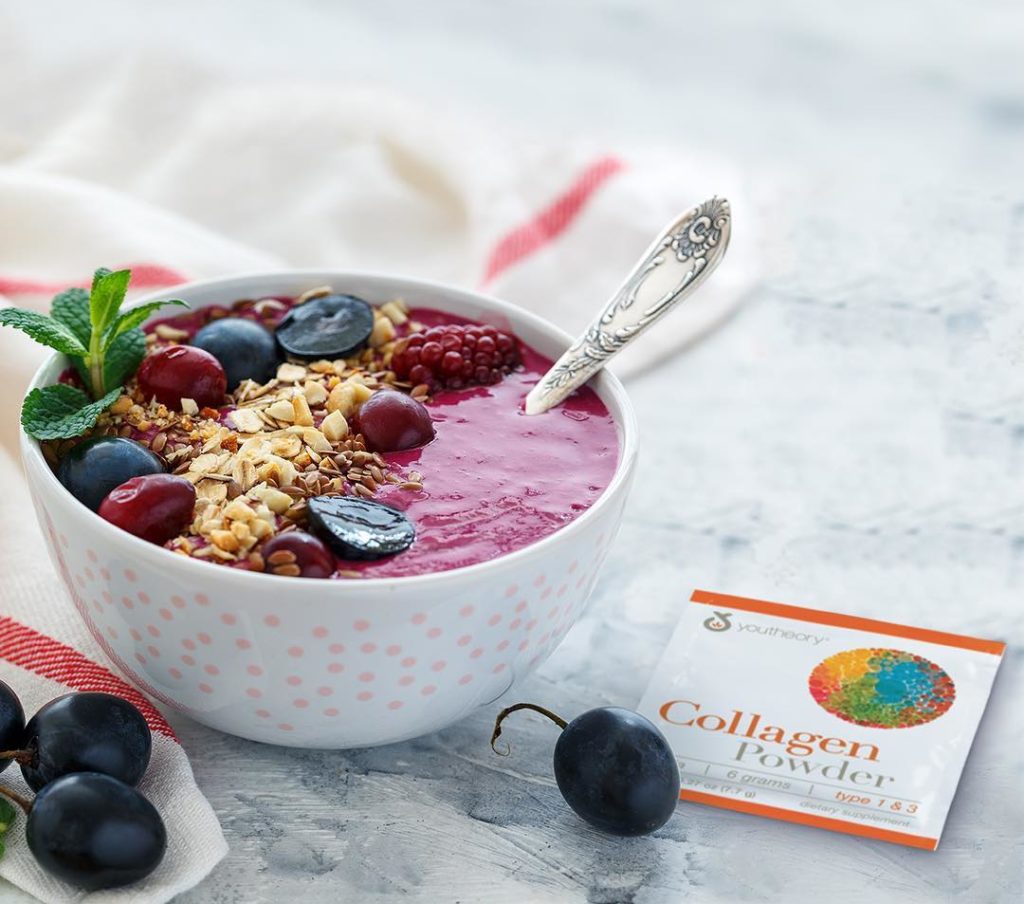What comes to mind when you think of collagen? Steaming mugs of bone broth, posted on social media? Or perhaps a lip-plumping craze from the 80’s? We’re going to dispel some of the confusion surrounding this popular supplement. Following a vegetarian or vegan diet? We’ll share how you can help your body naturally produce more collagen all on its own – keep reading!

Photo courtesy of Vital Proteins
What is collagen?
Collagen is a protein that binds tissues in the body. It is found in the connective tissue of animals in skin, muscles, and bones. Our bodies make collagen from the amino acids, vitamins, and minerals we eat. We get amino acids from protein-rich foods like beef, chicken, beans, and dairy products. The vitamins and minerals our body relies on to produce collagen include vitamin C, zinc, and copper, which are found in produce like leafy greens, broccoli, citrus, and tomatoes.
There are different types of collagen, which differ in amino acid, or peptide, composition; some form skin, while others form cartilage and repair muscles.
What foods contain collagen?
Bone broth, chicken skin, cuts of beef such as short ribs and osso bucco, and wild salmon eaten with the skin are all whole-food sources of collagen. When in doubt: remember that collagen is found in skin, muscles, and bones, so animal cuts that contain them will provide the most collagen.
Is collagen different than gelatin?
When collagen is cooked and breaks down, it becomes gelatin. Therefore, consuming gelatin provides beneficial amino acids just like collagen.

Photo courtesy of Youtheory
How does the body use collagen?
When you eat collagen-rich foods, the body breaks down the collagen into individual amino acids and peptides, which are used to build muscle, bone, cartilage, connective tissue, skin, hair, and more.
Collagen is a rich source of non-essential and essential amino acids. “Non-essential” amino acids are called this because they are normally produced by the body, and therefore not needed through diet; however, an unhealthy or stressed body will not be able to produce enough on its own. These non-essential amino acids include glutamine, glycine, and proline, among others. Even if you eat animal proteins, not all amino acids are found in commonly eaten cuts. Many are found only in organ meats and in bones, as described above, which is why some people like to supplement with collagen.
Why should I consider supplementing with collagen?
The body’s ability to produce collagen naturally decreases as we age. Production slows as early as our mid-twenties! Plus, smoking, alcohol, sunburn, and consuming too much sugar can all affect the body’s ability to produce collagen. Without strong collagen production, skin starts to sag, wrinkle, and dry out, and joints start to ache.
What are the potential benefits of collagen supplementation?
The possible benefits of collagen are far reaching, however it should be noted that many of the studies done in this field are relatively small, and the science is in its infancy. Some promising benefits include improving skin elasticity, easing symptoms of osteoarthritis, inhibiting bone breakdown that leads to osteoporosis, and improving nail growth and strength. Collagen is also said to improve symptoms of a leaky gut, and has the potential to boost muscle mass and metabolism. More studies are needed to confirm these claims.
Fortunately, there are very few side effects or risks when it comes to trying a collagen supplement, so you may wish to try a few different options until you find what works best for you.

Photo courtesy of Ancient Nutrition
What types of collagen supplements are available?
Collagen supplements come in a variety of forms, including capsules, powders, tablets, and chews. Most collagen powder is hydrolyzed, sold as “collagen peptides”, which means that the amino acid chains are already broken down. It is thought to be more easily absorbed by the body in this form, plus then it conveniently dissolves in both cold and hot liquids. There are endless ways to use collagen in its powdered form: mix it into smoothies, soups, and dips, or bake it into desserts.
Wondering where to start? Our knowledgeable apothecary team members are always ready to help! Kimberton Whole Foods customer-favorites include Vital Proteins Collagen Peptides, Vanilla Collagen Peptides, and Matcha Collagen, Neocell Super Collagen Powder, and Garden of Life Collagen Peptides. Our expansive selection also includes options from these fantastic brands: Youtheory, Ancient Nutrition, and Great Lakes.
“I love the Vital Proteins Matcha Collagen. The Matcha gives me balanced energy and stress relief, while the collagen has truly helped my joints and made my hair and nails grow!” – Christy, Apothecary Department Head in Kimberton
For our vegan customers, look to Sunwarrior Collagen Building Protein Peptides and Amazing Grass Amazing Protein Glow. These high-quality formulas aim to support the body in creating its own collagen, as it’s meant to do!
Do you take collagen? Let us know what benefits you’ve experienced in the comments below!






Do you sell vegan collagen? I sure could use some!
Hi Sue! We offer a product from Sunwarrior called “Collagen Building Protein Peptides” which is completely plant-based. Please call our store if you have any questions about this product!